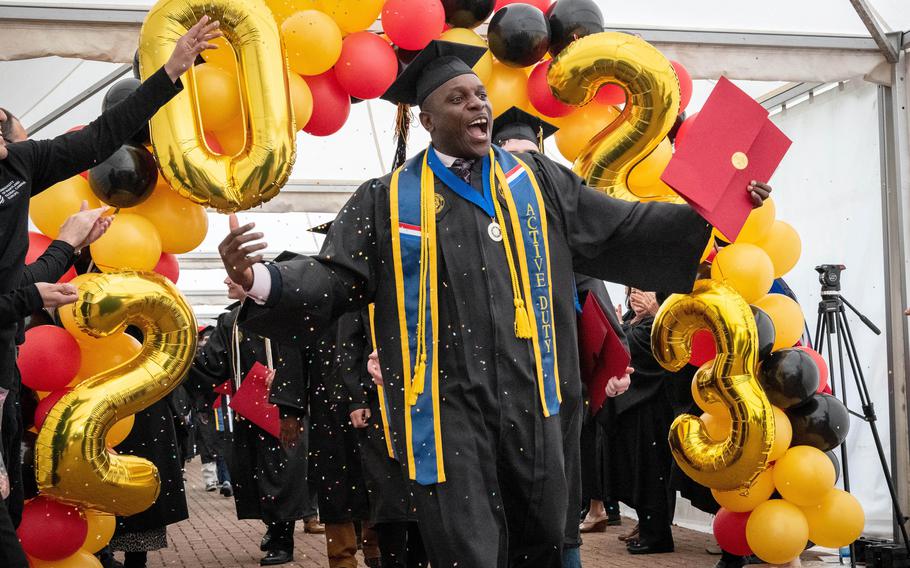
Army Sgt. Christian Awuku celebates after graduating with a bachelor’s degree from the University of Maryland Global Campus, Saturday, April 29, 2023. (Phillip Walter Wellman/Stars and Stripes)
RAMSTEIN AIR BASE, Germany — The University of Maryland Global Campus prides itself on going “wherever the military is” to provide higher education to American troops and others in the defense community.
The school’s reach was on display Saturday, when more than 200 of its students from across Europe, Africa and the Middle East – about a fifth of those who earned associate, bachelor’s or master’s degrees this year – walked across the stage.
Most of the graduates were based in Europe, and some studied while simultaneously working on NATO’s eastern flank, where the Pentagon has been working to bolster unity among allies since Russia’s invasion of Ukraine in early 2022.
University officials recently opened new locations in Poland and Romania to accommodate the influx.
“What’s happening in Ukraine clearly has impacts,” UMGC President Gregory W. Fowler said in a pre-ceremony interview. “Whatever circumstances the military is trying to deal with are things we’re trying to work our way through.”
Fowler, who delivered the commencement speech, referred to graduates as “pioneers,” for dealing with various challenges in the current environment.
“A lot of the work we’re doing is specifically because we are seeing challenges in traditional educational models,” Fowler said. “Those are things we’re responding too, but that’s always been what UMGC does.”
While new technology is allowing students to learn in more disparate environments, the learning experience itself remains as taxing as ever and requires determination and discipline to succeed, according to Army Maj. Jacob Lynn, who received a master’s degree in software engineering.
“There are times when we’re actually in the field and I sneak away for an hour to try to work on studies,” said Lynn, who works in civil and public affairs at the Army’s training area at Grafenwoehr, Germany.
Army Sgt. Christian Awuku of the 39th Transportation Battalion, which has carried cargo across Europe in support of Ukraine, earned a bachelor’s degree in cyber security, and expressed similar sentiments.
He eventually closed all his social media accounts to better focus on course work.
“I’m still getting messages that say: ‘Hey, you’re not liking my posts.’ But I’m learning,” said Awuku, who plans to start studying for his master’s degree this summer and doesn’t foresee returning to social media.
“The more I ghost, the better I do,” he said.
Service members such as Lynn and Awuku made up nearly 60% of UMGC Europe’s graduating class. Some said they chose to study to help them advance in their military careers, while others were looking for accreditation to eventually help them get civilian employment.
The average age of an associate degree graduate was 29. Bachelor’s and master’s degree graduates were, on average, 34 and 37, respectively.
About 60% of the class was married, including specialists Kristina and Matthew Ybara, military police officers based in Germany’s Kaiserslautern military community, who both received associate degrees in general studies.
“It’s not easy, but it can be done,” Matthew Ybara said of studying while working.
The Ybaras said online classes allowed them to do their coursework while traveling, so they also didn’t have to miss out on seeing parts Europe while stationed overseas.
“We encourage other people we talk to, to start studying too, especially because it’s free,” Kristina Ybara said, referring to having classes paid by the G.I. Bill.